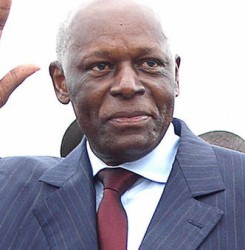LUANDA, (Reuters) – When a halving of oil prices left a gaping hole in Angola’s finances this year, it became clear sub-Saharan Africa’s third largest economy needed help fast – and President Jose Eduardo dos Santos knew exactly where to turn.

But the multi-billion dollar loans he signed with China last month have angered Angolans who say they have been left behind as politicians and China share the spoils and Africa’s second-largest oil producer becomes ever more reliant on Beijing.
China has lent Angola around $20 billion since a 27-year civil war ended in 2002, according to Reuters estimates.
Repayments are often paid with oil or funds go directly to Chinese construction firms that have built roads, hospitals, houses and railways across the southern African country.
This means, however, dollars don’t end up entering the real economy, increasing costs for ordinary Angolans.
“I think the president humiliates Angolans,” 35-year-old cook Marisa told Reuters as she bartered with a street trader over peanuts and bananas in the capital. “The agreements with China are a benefit for them and the president and not for us.”
Police visibility has increased in the streets of Luanda in response to public suspicion and dissent over how much the government would concede to Chinese interests in its bid to revive an economy hit by low crude prices.
More than a dozen people were arrested on June 20 for allegedly planning protests threatening “order and public security” in response to dos Santos’ China trip.
FLEC, a militant group that wants independence of the northern oil-rich exclave of Cabinda, demanded China repatriate all its citizens from the region within two months or risk being “severely punished”.
Angola has the best-funded military in sub-Saharan Africa and dissent is usually quelled quickly and ruthlessly, making any significant public backlash against the government unlikely, security experts say.
“IN A PICKLE”
Apparently aware of unease at home, dos Santos, a Soviet-educated petroleum engineer who has been in charge for 36 years, kept the details of the latest deals secret and stressed the “cooperation” and “mutual benefits” from his Beijing visit.
Chinese Premier Xi Jinping hinted at a much more lopsided relationship, saying he had agreed to “assist” Angola, China’s largest supplier of crude after Saudi Arabia.
It is almost impossible to miss Beijing’s influence in Angola, from construction site signs in Chinese script to expensive Chinese restaurants and seedy “Asian-only” massage parlours in the capital’s alleyways.
Despite reservations from jobless Angolans, economists see China’s dominant role in Angola as necessary.
Angola, which relies on oil sales for 95 percent of foreign exchange revenues, slashed a third off its budget and said it would need to borrow $25 billion this year – $15 billion domestically and the rest abroad.
“Lower oil prices have put Angola in a bit of a pickle and the most obvious place to turn is China,” said Cobus de Hart, an analyst at NKC African Economics. “If China can help Angola get out of the fiscal hole then it could be a positive step.”
Despite this, many Angolans are distrustful of the relationship, pointing to the millions who still live on less than $2 a day and World Bank studies that rank the country 169 out of 175 countries in terms of income equality.




